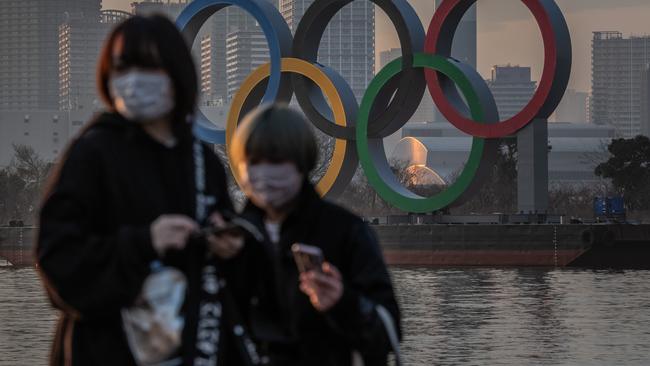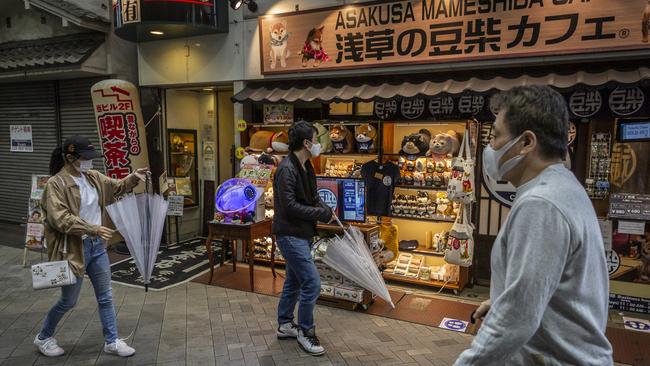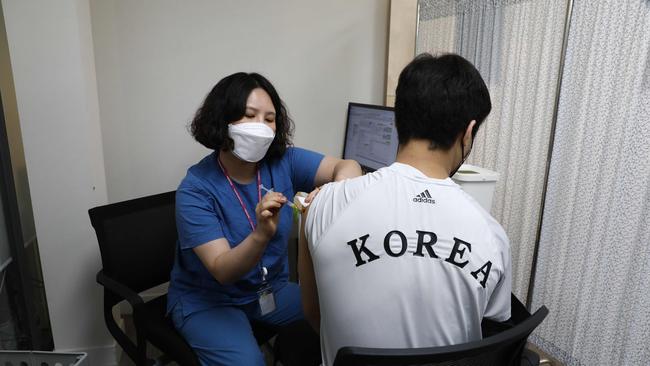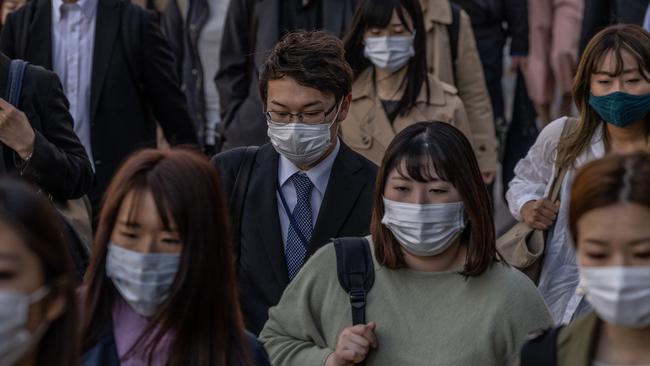Two months until Olympics but Japan isn’t jabbing
Japan’s handling of the pandemic has put its peers in the rich developed world to shame. But in one metric it is trailing miserably.

In all ways but one Japan’s handling of the coronavirus pandemic has put its peers in the rich developed world to shame.
Without forced lockdowns or a prolonged closure of schools, a large, rich country with some of the world’s biggest and most densely populated cities has kept infections down to a level that would be regarded as a triumph in Washington, Paris or London.
Well-established habits of hand washing, mask-wearing, and the custom of greeting with bows rather than handshakes and embraces, have helped, as did the early decision to close borders.
With twice the population, Japan has experienced one-eighth the number of infections (570,000) and one-thirteenth the number of deaths (10,000) as Britain. But, having outperformed its fellows in the Group of Seven rich countries in most metrics, Japan is trailing miserably on the most crucial of all - vaccinating its population.
As people in much of the western world enter a new phase of the pandemic, with large scale vaccinations that promise a steady return to normality over the summer, Japan has hardly begun.
A quarter of Germans, two fifths of Americans and half of Britons have had at least one jab. In Japan, fewer than one in 50 have.
More than two months after it began to vaccinate, little more than two million of Japan’s 126 million people have been inoculated.
Many medical workers have not yet been protected. The over-65s are not due to be fully vaccinated until the end of July at the earliest. No one in the rest of the population has been told when their turn will come.

The uncertainty and anxiety is hurting the election prospects of Japan’s prime minister, Yoshihide Suga. It is casting further doubt on the country’s capacity to safely host the Tokyo Olympics in July.
Why has Japan, which has had a moderate-to-good pandemic so far, stumbled at this decisive hurdle?
There is no single answer. Rather, a combination of caution, hesitation, bureaucratic inertia and political complacency have combined to choke off the urgency seen in other countries.
Even before Covid-19, and despite generally high levels of trust in doctors, Japanese were hesitant about vaccination.
In the past, pharmaceutical companies have been sued over alleged side effects from the MMR jab. When a vaccination against the human papillomavirus (HPV), which causes cervical cancer, was made available free to girls aged 12 to 16, a high initial take-up dropped to 1 per cent after complaints about supposed side effects including muscle pain and sleep disorders.
The scientific consensus is that these complaints were unrelated to the vaccine, but doubt about jabs in general survives, both among members of the public and among bureaucrats nervous about rushing into decisions that could potentially leave them vulnerable to future legal action.
Unlike Britain, France, Germany, the United States, Russia and China, and to the quiet disappointment of its leaders, Japan still has no viable vaccine of its own. Its domestic industry is small. Compared to the giant European and American pharmaceutical companies, Japan’s have less money for research and development.
Four Japanese companies are carrying out clinical trials, but at this stage in the pandemic it has become a difficult task. Japanese understandably want to receive a tried and tested jab. Like most countries, Japan must rely on imported vaccines which are subject to a notoriously slow and inflexible approvals process.
In the past, this has served to buy time for domestic pharmaceutical companies to develop competing products of their own. In a global pandemic, it has been a barrier to the kind of expedited approvals pushed through in western countries last year.
The trials of the Pfizer vaccine, for example, did not include any Japanese subjects. Under government rules, separate trials had to be held to exclude the possibility of side-effects specific to those of Japanese ethnicity. It included no more than a few hundred people, a token number unlikely to be statistically significant - but having made a show of jumping through this regulatory hoop, regulators approved the vaccine in December, two months after western Europe and the US.
The government has made deals with Pfizer, AstraZeneca and Moderna to secure ample vaccines for the whole population. The first supplies of Moderna landed this week. But only Pfizer has been approved, and even then inflexibilities and inefficiencies have slowed down the job of getting it into the arms of the population.

At first, there was a shortage of cold storage and then of appropriate syringes. Local rules permit only qualified medical personnel, rather than trained volunteers, to administer the jabs. Last week it was decided that dentists will be recruited to help overstretched doctors and nurses.
Bureaucracy has been staggeringly inflexible. When people have failed to turn up for vaccine appointments, leaving perishable Pfizer doses unused, rather than giving them to people not on the list, vaccination centres have thrown them away out of concern for “fairness”.
Plenty of people in Japan are exasperated by such pettifogging adherence to rules. On Wednesday, a group of business leaders, doctors and a Nobel Prize-winning biologist, implored the authorities to get a grip for the sake of the economy, if nothing else.
“There is no firm target for when vaccination of the general population will be completed, and therefore no clear vision [of] how to balance the prevention of further infection with the resumption of economic activities,” said the Japan Association of New Economy.
The group pleaded with the government to speed up and simplify procedures for booking a vaccine appointment, to permit emergency approvals of vaccines and to allow paramedics, pharmacists and medical students to help out the dentists in administering jabs.
“The government and local administrations must not be constrained by outdated thinking and must make effective use of private sector expertise,” the group said.

Perhaps Japan’s success in avoiding the worst ravages of the pandemic has also reduced its drive to vaccinate. Unencumbered by mandatory lockdown, the past year has been no more than an irritating nuisance for many people, rather than a soul-destroying disaster. But the sluggishness of the vaccine rollout threatens to have big consequences.
Suga’s government has imposed a third state of emergency on Tokyo and other bigger cities, the most stringent so far, as infection rates rise to the highest levels in months. Rates of new infections and deaths in Japan on a weekly basis have started to surpass those in the UK.
A recent poll found that more than 60 per cent of people are dissatisfied with vaccine policy, and more than 90 per cent are worried about the current wave, Japan’s fourth. Last weekend Suga’s Liberal Democratic Party suffered a stinging defeat in three by-elections.
The most nightmarish prospect is the effect of all this on the Tokyo Olympics, postponed since last year and scheduled to open at the end of July. The government and the organisers of the Games insist they can be held safely, and are bending their efforts to devising regimes of testing, isolation and social distancing.
Most members of the public do not want them to go ahead, fearing the potential for a super-spreader event at a time when only a small proportion of them will be immunised.
The time may come when the government wishes that it had committed as much energy to injecting its people as it has to holding the world’s biggest sporting event during its most disastrous modern pandemic.



To join the conversation, please log in. Don't have an account? Register
Join the conversation, you are commenting as Logout